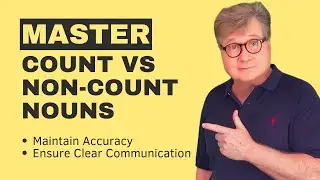Countable and Uncountable Nouns: Practical Applications in Daily Communication
What are countable and uncountable nouns? Countable nouns are objects like 'apple,' 'book,' or 'car' that we can make plural. You can have one apple, two apples, three apples, and so on. Countable nouns have a plural form, typically ending in 's' or 'es.'
On the other hand, uncountable nouns, also known as mass nouns, cannot be counted individually. Examples include 'water,' 'information,' and 'music.' These nouns don’t have a plural form and are treated as singular. You wouldn’t say 'musics' or 'informations,' right?"
Let's look at an example. Consider these sentences:
1. I always eat an apple for lunch.
2. I always eat apple for lunch.
Only the first sentence is correct. We must say “an apple” because 'apple' is a countable noun. We can count how many apples we eat or buy.
Now, why does this matter? Understanding the difference helps you use the correct quantifiers and avoid grammatical errors. Let’s look at a few practical scenarios.
Imagine you're writing a grocery list. For countable items, you might write: two pineapples and a half dozen eggs. For uncountable items, your list might include sugar and salt.
Using the correct terms ensures that the person reading your list understands exactly how much you need. If you wrote “three sugars and two salts” it would be confusing.
In a professional setting, especially in written communication, this distinction is crucial. Suppose you’re drafting a report or an email. You might say, 'We need more information before we can proceed.' Here, "information" is uncountable, so you wouldn’t say "We need more 'informations.'"
Similarly, when discussing evidence, you’d use, "The evidence is being analyzed," because "evidence" is an uncountable noun.
Even in casual conversations, the correct use of countable and uncountable nouns can make your speech clearer and more precise. For instance, if you’re talking about your weekend plans, you might say, "I have a few plans," referring to "plans" as countable, but "I need some advice on where to stay" because "advice" is uncountable.
To sum up, the distinction between countable and uncountable nouns helps to maintain grammatical accuracy and ensure clear communication. Whether you’re shopping, working, or chatting with friends, this knowledge is incredibly practical.







![💖Korean Drama💖Kiss Goblin [키스요괴]💖Ban Sook X Oh Yeon Ah💖Love Story FMV](https://images.mixrolikus.cc/video/vOGrHlW1SiE)











